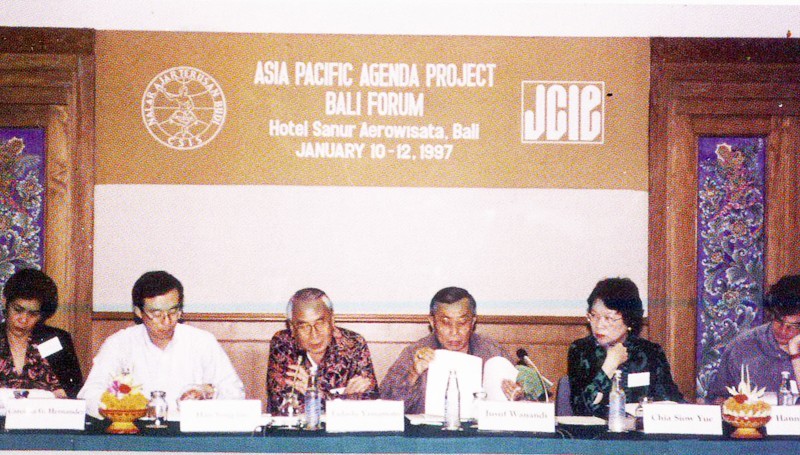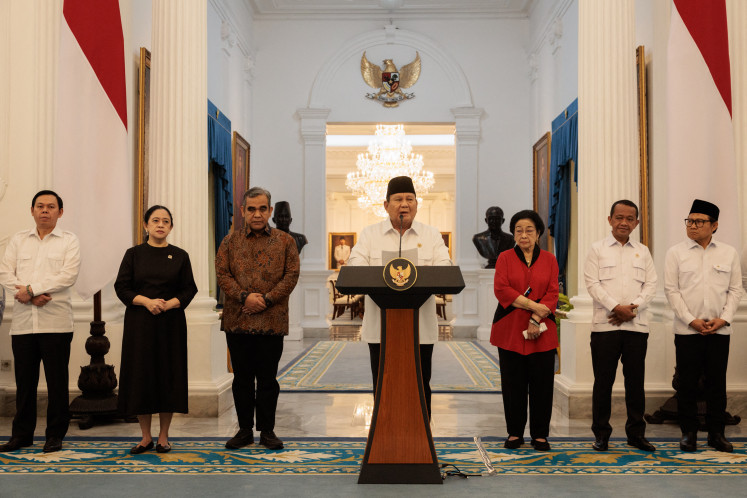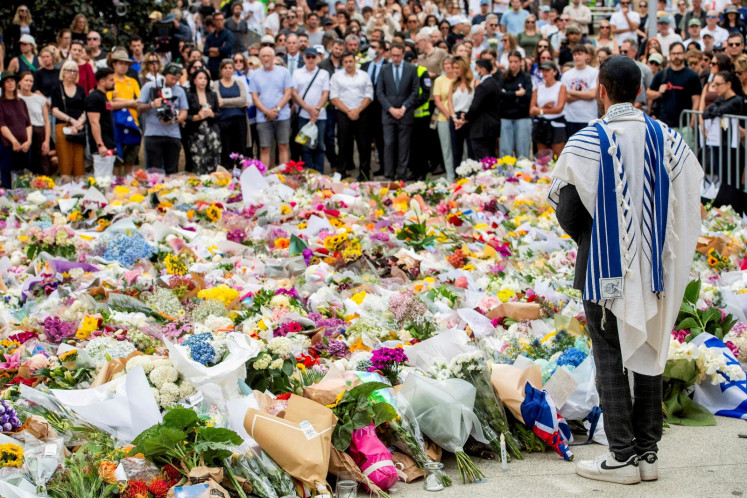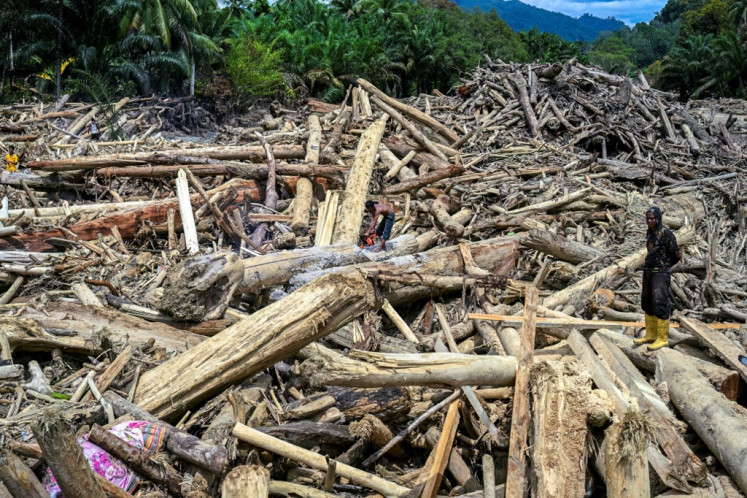Popular Reads
Top Results
Can't find what you're looking for?
View all search resultsPopular Reads
Top Results
Can't find what you're looking for?
View all search resultsCSIS: Remembrance of things past
Change text size
Gift Premium Articles
to Anyone
 Strategic talk: Centre for Strategic and International Studies (CSIS) co-founder Jusuf Wanandi (center) joins an international panel of experts to discuss cooperation among Asia-Pacific countries in Bali in 1997, with Carolina Hernandez of the Philippines (left to right), Han Sung-joo of South Korea, Tadashi Yamamoto of Japan, Chia Siow Yue of Singapore and Hanns Maull of Germany (Courtesy of CSIS/-)
Strategic talk: Centre for Strategic and International Studies (CSIS) co-founder Jusuf Wanandi (center) joins an international panel of experts to discuss cooperation among Asia-Pacific countries in Bali in 1997, with Carolina Hernandez of the Philippines (left to right), Han Sung-joo of South Korea, Tadashi Yamamoto of Japan, Chia Siow Yue of Singapore and Hanns Maull of Germany (Courtesy of CSIS/-)
T
oday, the Centre for Strategic and International Studies (CSIS) celebrates its 45th anniversary and for people behind the think tank and its partners, the journey has been memorable.
Many who are intimate with the institution say that throughout the years, the CSIS, which is one of the oldest think tanks in Indonesia, has proven to be an indispensable part of the country’s development, particularly in politics, the economy and foreign policy.
“It has been a place where Indonesians could exchange views about the future of their country and where foreigners like myself could gain a better understanding of this amazing and complex society. I cannot think of any other example of a think tank which has had a similar impact on a country’s development during a period of historic change,” said Paul Wolfowitz, a former World Bank president who also served as US ambassador to Indonesia between 1986 and 1989.
Despite financial and human resources constraints, the CSIS has succeeded in building its reputation as one of the best think tanks in Asia, thanks to the brains behind it and its ambition to contribute to scientific research in the country.
“There’s a sense of satisfaction and pride when I look back at the CSIS’ journey because it’s not easy to survive,” said one of the CSIS’ founders, Clara Joewono. Together with the late Hadi Soesastro, Clara, who was a student leader during the tumultuous period of 1965, led a small staff that eventually became the think tank’s organizational brain.
The CSIS was able to persevere largely due to its ability to win many friends and close acquaintances, Clara said.
As it slowly built its reputation, the CSIS was able to attract the brightest minds in the country.
“They fully realize that if they join the CSIS to become researchers, they will never be rich, compared to if they work in the private sector. For those who stay at the CSIS for dozens of years, they do so because the CSIS gives them the chance and the freedom to develop themselves,” Clara said.
The opportunity to develop a worldwide network is also part of why many young and talented minds want to join the CSIS, she said.
Clara recalled what Daoed Joesoef, another founding member of the CSIS, said about the foundation that would define the institution.
“When we become students, we learn to become experts in a particular field that we like. If we enter a think tank like the CSIS, we develop ourselves. You are on your own. You develop yourself or you perish,” she said.
And it is these bright young minds and their willingness to contribute to society that are remembered fondly by many close acquaintances of the CSIS.
“During my years as ambassador to Indonesia I was impressed by the quality of debate and discussion at CSIS and by the remarkable candor with which people even discussed the failings of the regime in power,” Wolfowitz said.
Former Australian foreign minister Gareth Evans has nothing but fond memories of the CSIS.
“As long as I can remember the center, with its now legendary cast of leaders, has been a source of intelligent, sound and balanced analysis, advice and advocacy, on international and regional affairs generally, and the Indonesia-Australia relationship in particular. In these uncertain times, its voice has never been more needed,” he said.
Ong Keng Yong, ASEAN secretary-general from 2003 to 2007, said that the heart of the CSIS was its founding members.
“I am delighted that a number of the founding members of the CSIS, particularly Daoed Joesoef, Harry Tjan Silalahi, Jusuf Wanandi and Clara Joewono are still active. My senior colleagues in Singapore remember turning to these founding members of the CSIS and their younger colleagues, including the late Hadi Soesastro and more recently, Rizal Sukma, for a deep understanding of not only Indonesia’s foreign policies, but also its domestic politics and economic development,” he said.
Wolfowitz said that the CSIS founders left large shoes for the younger generation to fill.
“CSIS itself is going through a change of generations. A new generation of thinkers and leaders must now step into the shoes of the remarkable first generation of Hadi Soesastro, Harry Tjan Silalahi, Clara Joewono and the endlessly energetic Jusuf Wanandi, to ‘build’, as Wanandi himself has put it, ‘a society that is plural, open and democratic with social justice’,” he said.
Others remember the CSIS for its role in bringing together well-established think tanks in ASEAN under the ASEAN Institutes of Strategic and International Studies (ASEAN-ISIS) in 1984.
“Over the years, ASEAN-ISIS has tried to help shape Southeast Asia’s broad security in terms of building the fabric of regional peace, prosperity and stability not only in Southeast Asia, but also in the broader region of East Asia and the Asia Pacific,” said Carolina G. Hernandez, the founding president of the Institute for Strategic and Development Studies (ISDS Philippines).
National Resilience Institute (Lemhanas) governor Agus Widjojo said the CSIS had been the best representation of Indonesia abroad.
“We can see that the CSIS has represented Indonesia in many meetings, especially in the ASEAN scope and beyond,” he said.
Looking ahead, the CSIS could strive to produce more innovative analyses and ideas to answer the more complex challenges that Indonesia is facing.
“This country needs brilliant thinking, which the government doesn’t have. That’s why the CSIS is important. Ministries have research and development departments, but they are peopled by leftovers, not very smart people,” said Anwar Nasution, a professor of economics at the University of Indonesia and former senior deputy governor of Bank Indonesia.
The CSIS, meanwhile, is facing new challenges that could test its ability to stay ahead of the curve.
CSIS co-founder Jusuf Wanandi said one of the most pressing issues was challenges that ASEAN currently faced, particularly its territorial disputes with China.
“We have to play a more active role and duty. This is a problem that we, as the CSIS, have an advantage in because we have been engaged in this matter for 45 years and we have good connections everywhere. That’s what we can contribute to the government. And for that, we have to get the younger generation to participate,” Jusuf said.









